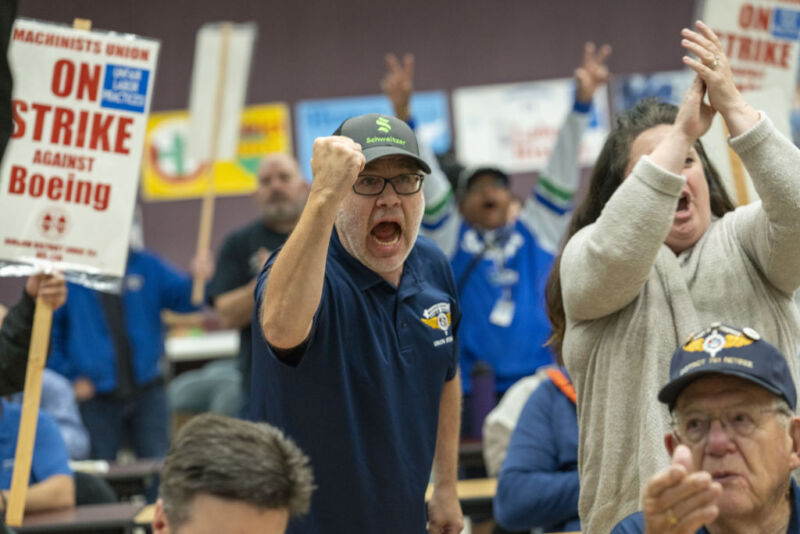Boeing risks losing billions as 33,000 workers vote to strike

More than 33,000 unionized Boeing workers went on strike Friday, rejecting what they say were unfair terms of a deal the embattled aerospace company tentatively reached with their union.
The rejected deal tried and failed to win over workers by offering a 25 percent wage increase and promised to build Boeing’s next jet in the Puget Sound region in Washington, which Boeing claimed offered “job security for generations to come.”
But after International Association of Machinists and Aerospace Workers (IAM) District 751 president Jon Holden urged the union to accept the deal—which Boeing said was the “largest-ever general wage increase” in the company’s history—hundreds of Boeing employees immediately began resisting ahead of a Thursday vote that ultimately doomed the deal.
Instead of agreeing to a deal that compromised the desired 40 percent wage increases and eliminated workers’ annual bonuses, about 96 percent of workers voted to strike, The Washington Post reported. Rather than take what Boeing offered, workers seized rare leverage amid Boeing’s financial and production woes to pursue better terms.
“We’ve got a lot of leverage—why waste that?” Joe Philbin, a structures mechanic, told the Post ahead of the vote in a Seattle union hall Thursday. Philbin has only been with Boeing for six months but already wants changes in mandatory overtime rules.
An overwhelming majority of the union agreed that the deal was not good enough, so Holden told the gathered workers, “We strike at midnight.”
The statement incited loud cheers from workers who chanted, “Strike! Strike! Strike!”
Boeing workers have not walked out since 2008, when a 57-day strike cost Boeing about $1.5 billion, the Post reported. Analysts told Bloomberg that the current strike is estimated to last about 50 days, too, potentially costing Boeing between $3 billion and $3.5 billion.
The aerospace company cannot afford any work stoppage—let alone a strike from workers playing “a key role in assembling some of the company’s best-selling aircraft,” which the Post said could be the company’s “most disrupting challenge yet.” Analysts told the Post that on top of assembly delays in critical plants in Washington, an extended strike could hurt Boeing suppliers and Boeing’s market share.
Boeing’s spokesperson told Ars that the company is eager to get back to the bargaining table.
“The message was clear that the tentative agreement we reached with IAM leadership was not acceptable to the members,” Boeing’s spokesperson said. “We remain committed to resetting our relationship with our employees and the union, and we are ready to get back to the table to reach a new agreement.”
Why did Boeing workers reject the deal?
Boeing likely anticipated that the deal wasn’t good enough after Holden told The Seattle Times on Wednesday that workers would probably vote to strike.
Two days before that, Holden posted a message to workers after receiving “hundreds of messages and emails” expressing concerns about the tentative deal that he recommended that they accept.
“Emotions are high,” Holden acknowledged.
Holden told workers that it would have been impossible to respond to everyone individually and reassured them that the tentative deal was not binding.
“A Tentative Agreement is not certain or fixed, and it’s certainly not final,” Holden told workers. He further clarified that the deal simply represented the best terms that the union could get Boeing to agree to without a strike.
https://arstechnica.com/?p=2049657